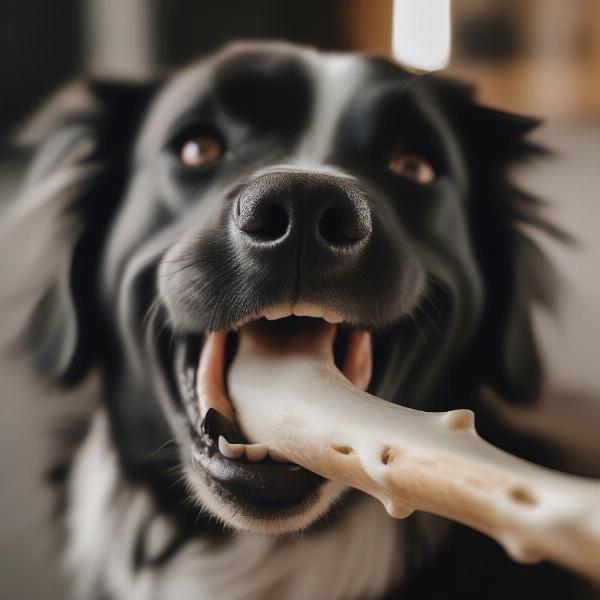Choosing the right chew for your dog can be overwhelming with the vast array of options available. From durable chew toys for aggressive chewers to dental chews for promoting oral health, finding the “best dog chews” requires careful consideration of your dog’s size, age, chewing habits, and overall health needs. This guide will delve into the various types of dog chews, their benefits, and how to select the perfect one for your furry friend.
Understanding the Importance of Dog Chews
Chewing is a natural and instinctive behavior for dogs. It provides numerous benefits, including:
- Dental Health: Chewing helps to scrape away plaque and tartar buildup, promoting healthier gums and fresher breath.
- Mental Stimulation: Chewing can help to alleviate boredom and reduce anxiety, preventing destructive behaviors.
- Jaw Exercise: Chewing strengthens jaw muscles and provides a healthy outlet for pent-up energy.
- Teething Relief: Puppies, in particular, find chewing soothing during the teething process.
 Dog Chewing on a Bone: Benefits of Chewing
Dog Chewing on a Bone: Benefits of Chewing
Types of Dog Chews
There are various types of dog chews available, each with its own advantages and disadvantages:
- Natural Chews: These chews, such as bully sticks, rawhide, and antlers, are made from natural animal products. They are long-lasting and provide a satisfying chewing experience. However, some natural chews, like rawhide, can pose a choking hazard if swallowed in large pieces.
- Synthetic Chews: Made from durable materials like nylon or rubber, synthetic chews are designed to withstand vigorous chewing. They come in various shapes and sizes, offering a safe and long-lasting chewing option.
- Dental Chews: Specifically designed to promote oral hygiene, dental chews often have textured surfaces that help clean teeth and massage gums. Some are even infused with breath-freshening ingredients.
- Treat-Filled Chews: These chews combine the enjoyment of chewing with the reward of a tasty treat hidden inside. They can help to keep dogs entertained and motivated during training sessions.
Choosing the Right Chew for Your Dog
Selecting the appropriate chew for your dog depends on several factors:
What is the best chew for an aggressive chewer?
For aggressive chewers, opt for durable synthetic chews made from tough nylon or rubber. best dental chews for dogs are also a good option for aggressive chewers who need help maintaining their oral health. Avoid natural chews that can splinter or break easily.
What are the safest chews for puppies?
Puppies benefit from softer chews designed for teething. Choose chews made from natural rubber or soft nylon. Avoid giving puppies hard chews that could damage their developing teeth.
Are there specific chews for senior dogs?
Senior dogs with dental issues may prefer softer chews or dental chews that are gentle on their gums. best grain free skin and coat dog chews can also be a good option for senior dogs who need a boost for their skin and coat health.
Ensuring Safe Chewing Habits
While chewing is beneficial, it’s crucial to supervise your dog and ensure they chew safely:
- Size Matters: Choose chews that are appropriately sized for your dog to prevent choking hazards.
- Supervision is Key: Always supervise your dog while they are chewing, especially with new chews.
- Replace Worn Chews: Discard and replace any chews that become excessively worn or small enough to be swallowed.
- Know Your Dog’s Habits: Observe your dog’s chewing habits and choose chews that suit their individual needs.
Conclusion
Choosing the best dog chews for your furry companion is an important part of responsible pet ownership. By understanding the benefits of chewing, the different types of chews available, and your dog’s individual needs, you can provide them with a safe and enjoyable chewing experience that promotes both their physical and mental well-being. Remember to always supervise your dog while chewing and replace worn chews promptly.
FAQ
- What are the best dog chews for dental health? Dental chews designed with textures and ridges are excellent for promoting oral hygiene.
- Can I give my dog cooked bones as chews? Cooked bones are dangerous for dogs as they can splinter and cause internal injuries. Stick to raw bones or commercially available dog chews.
- How often should I replace my dog’s chew? Replace chews when they become small enough to be swallowed or excessively worn.
- Are all natural chews safe for dogs? Not all natural chews are safe. Some, like rawhide, can pose choking hazards. Research and choose reputable brands.
- What if my dog doesn’t seem interested in chewing? Try different types of chews to find one that appeals to your dog’s preferences. You can also try stuffing treat-filled chews to make them more enticing. can dogs have sauerkraut
- My dog is a very aggressive chewer. What are my options? Durable synthetic chews made from nylon or hard rubber are best for aggressive chewers. crown for a dog
- Are there any chews that can help with my dog’s anxiety? Chewing can be a calming activity for dogs. Look for long-lasting chews that will keep your dog occupied and help them to relax. brushless toothpaste for dogs
ILM Dog is a leading online resource dedicated to providing dog owners worldwide with reliable and practical information on all aspects of dog care, from breed selection and health to training, nutrition, and grooming. We are passionate about helping you provide the best possible care for your canine companion. For further assistance or personalized advice, please contact us at [email protected] or call us at +44 20-3965-8624. ILM Dog is committed to promoting responsible dog ownership and happy, healthy dogs worldwide.